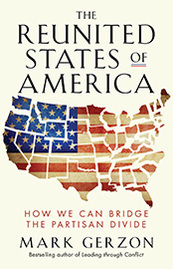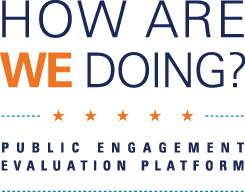Last year, the Kettering Foundation – one of our NCDD organizational members – convened several university presidents that inaugurated an important effort to help higher education reclaim its roots and role in supporting democracy throughout our society. The effort is being chronicled in a new KF blog series, and we wanted to share the first of the series here. We encourage you to read more about this great initiative below or find the original post here.
Template for Campus Conversations on Democracy
 Kettering has recently begun working with college presidents to move beyond their administrative and fundraising roles and provide new leadership for civic engagement. Beginning with a meeting with a small group of college presidents in July 2015, we found that these presidents were indeed eager to take leadership on themes of democracy and civic engagement on their campuses and with their stakeholders. This blog series, College Presidents on Higher Education and Its Civic Purposes, offers a space to gather and present their thoughts.
Kettering has recently begun working with college presidents to move beyond their administrative and fundraising roles and provide new leadership for civic engagement. Beginning with a meeting with a small group of college presidents in July 2015, we found that these presidents were indeed eager to take leadership on themes of democracy and civic engagement on their campuses and with their stakeholders. This blog series, College Presidents on Higher Education and Its Civic Purposes, offers a space to gather and present their thoughts.
For inquiries related to Kettering’s research on college presidents and the civic purposes of higher education, please contact barker[at]kettering[dot]org.
Based on initial conversations at Kettering, Paul Pribbenow, president of Augsburg College, and Adam Weinberg, president of Denison University, working with public intellectual, political theorist, and civic organizer Harry Boyte, also of Augsburg College, have drafted a brief overview of how higher education leaders can initiate these conversations. Campus Compact, as part of its activities in recognition of its 30th anniversary, and Imagining America’s Presidents Council, have already expressed interest in sharing the document with leaders in their networks.
In this inaugural post, Pribbenow describes the purpose of the document and offers an initial draft for comments and feedback.
Letter from Paul Pribbenow
Dear Colleagues,
In July 2015, the Kettering Foundation convened a meeting of presidents on how we, as leaders of our institutions, can more intentionally become public philosophers of education and democracy, in a time of deep unrest in our society as well as on campuses.
The group commissioned Adam Weinberg, president of Denison University, and myself, working with Harry Boyte from Augsburg’s Sabo Center for Democracy and Citizenship, to develop a Leadership Template on the topic. The template offers a few suggested focus areas and resources for presidents and higher education leaders to initiate campus discussions about democracy and citizenship.
We are eager for you to offer your thoughts about the diverse ways in which this template can be used. We aim to help spark a broad discussion on campuses and beyond about how we can strengthen democracy as a “way of life,” with higher education playing vital roles. I don’t have to explain why we need such a discussion.
This effort is undertaken in cooperation with Campus Compact’s 30th anniversary and Imagining America’s Presidential Council, which also has been discussing the democratic purposes of higher education.
Yours in service of our democracy,
Paul Pribbenow, President, Augsburg College
Leading Democracy Colleges and Universities: The Public Roles of Presidents
Drafted by Paul Pribbenow and Adam Weinberg, with Harry Boyte, January 2016
“The first and most essential charge upon higher education is that… it shall be the carrier of democratic values, ideals and processes.” – Truman Commission on Higher Education, 1947
“Our institutions need to be citizens of a place, not on the sidelines studying it.” – Nancy Cantor, Chancellor of Rutgers-Newark, 2015
The Truman Commission drew from a large and inspiring view of “democracy as a way of life” widespread early in the 20th century. As John Dewey put it, “Whether this educative process is carried on in a predominantly democratic or non-democratic way becomes a question of transcendent importance not only for education itself but for the democratic way of life.”
This view once infused higher education – land grant and public universities, liberal arts colleges, historically black colleges and universities, normal schools, state universities, and community colleges. “Most of the American institutions of higher education are filled with the democratic spirit,” said Harvard president Charles Eliot, conveying a large conception of democracy.
Today, though many colleges and universities invoke “democracy” or “democratic engagement,” it is rare to have public discussions that reflect on the actual meaning of democracy, just as it is easy to miss the deep challenge to cultures of detachment in Nancy Cantor’s call for colleges and universities to be “citizens of a place, not on the sidelines studying it.” In a time of threats to democracy at home and abroad, the meaning of “democracy” has shrunk along with the purposes of higher education. Democracy often means simply free and fair elections, as the US Agency for International Development defines it (see page 37 of the USAID Strategy on Democracy, Human Rights, and Governance). For many, colleges are a ticket to individual success.
Yet there are signs of renewed concern for the public purposes and work of colleges and universities, reviving higher education’s democratic roles. In this view, colleges and universities are centers of knowledge making and leadership formation, responsible not only for creating and dispensing information but also for addressing local issues and stimulating public exploration of great questions: What does it mean to have a “democratic way of life”? How can higher education, working with communities, help get us there?
This template on leading democracy colleges and universities responds to a request from a group of presidents brought together in July 2015 by the Kettering Foundation on “College Presidents and the Civic Purposes of Higher Education.” Like two efforts by National Issues Forums to organize deliberative dialogues on the purpose of higher education, Shaping Our Future and The Changing World of Work, and the Imagining America Democracy’s College discussion among a group of colleges and universities, it grows from the American Commonwealth Partnership invited by the White House to mark the anniversary of land grant colleges, a coalition to strengthen the public purposes and work of higher education. This effort also builds from efforts like the Carnegie Classification on Community Engagement and the President’s Honor Roll for Community Service that push back against narrow views of “excellence,” like the rankings of US News and World Report.
This statement aims to help spark a broad discussion, on campuses and beyond, about what it means for college and university presidents to lead a public conversation about democracy as a “way of life” with higher education playing vital roles. There is evidence that the nation may be ready for such a discussion. To launch this process, we suggest five focus areas for conversation and action:
Democracy Saga/Public Narrative: This focus area emphasizes an intentional campus and community-wide effort, working with students to recover, discuss, and engage the “saga” or “public narrative” of each unique educational community (for example, see Paul Pribbenow, “Lessons on Vocation and Location: The Saga of Augsburg College as Urban Settlement”).
Democratic Excellence through Diversity: This area of focus revitalizes the conviction, buttressed by research, that a mix of students with diverse backgrounds and talents, interacting in learning cultures of high expectation which develop their unique gifts, can achieve both individual and cooperative excellence, which no focus on winnowing out the stars can achieve (see “Lani Guinier Redefines Diversity, Re-evaluates Merit,” New York Times).
Preparation for Citizen Professional Leadership: This area of focus involves professional programs, disciplinary fields, and learning outside the classroom that recall the democratic values of scientific and other fields and instill democratic skills and habits of public work in students, as well as faculty and staff, to prepare students to be empowering civic leaders and change agents (see citizen professionals at Augsburg).
Free and Public Spaces: This area of focus develops intentional plans to create diverse free spaces and public spaces where students and others learn the skills of surfacing tensions and conflicts constructively, while working with others who are different (see Project for Public Spaces, “Campuses” and Adam Weinberg, “6 Tips for Getting the Most from a Liberal Arts College”). (See also the National Issues Forums issue guides and other resources for engaging campuses in deliberative dialogues on controversial issues.)
Citizens of Places: Colleges and universities as “stewards of place” and “anchor institutions” contributing to the civic and economic health of communities are spreading rapidly. These include a variety of practices, from college purchasing power used to support local businesses and partnerships in creating public spaces to collaboration on local school improvement and support for staff involvement in civic life (see the Anchor Institutions Task Force).
Presidents who act as “public philosophers of democracy and education” are key players in recovering a vision of democracy as a way of life. We encourage presidents to consider their roles in the context of the 2016 Campus Compact Civic Action planning process, which will commence in early 2016, in conjunction with the Compact’s 30th anniversary. Future meetings of college and university presidents, under the auspices of the Kettering Foundation, will offer opportunities to refine and grow this emerging understanding of the public roles of presidents in our democracy.
Other resources: “Democracy University” WNYC Radio show with Harry Boyte and Tim Eatman on the new book collection, Democracy’s Education: Public Work, Citizenship, and the Future of Colleges and Universities (Vanderbilt University Press, 2015). Research on concepts and practices of higher education civic engagement can also be found in several Kettering Foundation publications.
You can find the original version of this Kettering Foundation blog post at www.kettering.org/blogs/template-campus-conversations.
![]() This week, I will join a group of people from around the world meeting in Manila to talk about how to make democracy work in newer, better ways. Convened by Making All Voices Count, a collaborative of the Omidyar Network, the US Agency for International Development, the UK Department for International Development and the Swedish International Development Cooperation Agency, the group will include Asian and African democracy advocates, civic technologists and researchers.
This week, I will join a group of people from around the world meeting in Manila to talk about how to make democracy work in newer, better ways. Convened by Making All Voices Count, a collaborative of the Omidyar Network, the US Agency for International Development, the UK Department for International Development and the Swedish International Development Cooperation Agency, the group will include Asian and African democracy advocates, civic technologists and researchers.








